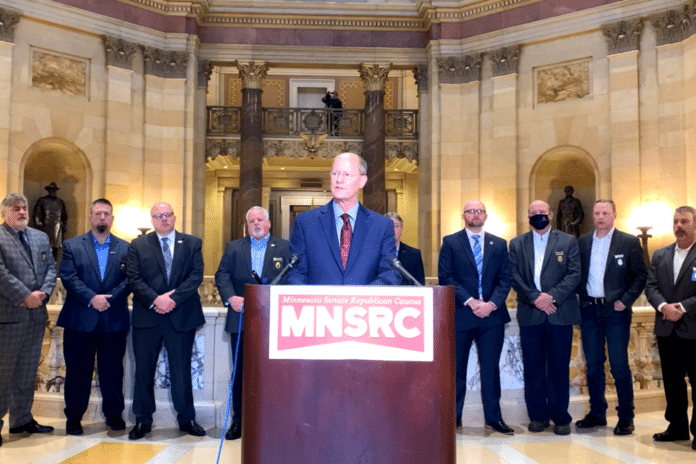
Minnesota lawmakers have begun an effort to combat state weakness in prosecuting dangerous criminals.
State Sen. Paul Gazelka, a Republican from East Gull Lake, is spearheading three legislative reforms: two of them will introduce mandatory minimum sentences for carjackings and repeat armed offenders, while the other will fund hiring bonuses for new police officers in high-crime areas.
Gazelka announced the bills at a press conference Friday morning.
“Gov. Walz and Democrat prosecutors are taking a weak approach on crime that directly undermines Minnesota’s laws and empowers criminals to continue their violent behavior across the state,” he said.
“These misguided ‘criminal-first’ approaches have already shown that they do not work, and law enforcement continues to be undermined in their efforts to stop serious offenders who have plagued our communities with multiple violent offenses. These failed policies need to go, and we must put the focus back on protecting victims and the law-abiding members of our communities,” he added.
If passed, the first minimum sentencing bill would mandate two to six years in prison for criminals who carjack, while the second bill would prevent judges from waiving the minimum sentence of five years for repeat armed offenders.
Also present at the press conference were law enforcement officials who endorsed Sen. Gazelka’s proposed legislation and criticized prosecutors who’ve demonstrated weakness in their handling of violent criminals.
“It is not the job of a prosecutor to decide which laws will be enforced and which ones will not. That is the job of the Minnesota Legislature,” said Jim Mortenson, executive director of Law Enforcement Labor Services. “It is the job of the Legislature to enact laws. It is the job of police officers to enforce those laws. It is the job of prosecutors to prosecute those laws. And it is the job of judges to uphold those laws.”
Mortenson also called out Ramsey County Attorney John Choi by name for refusing to prosecute felonies resulting from “low-level” traffic stops, a move he made this past September.
“My question is: what’s next? Will it be speeding? Will it be stop signs? Will it be stop light violations? Where will this end? We’re already heading down the path of selecting which laws we prosecute and which ones we won’t,” Mortenson added.












